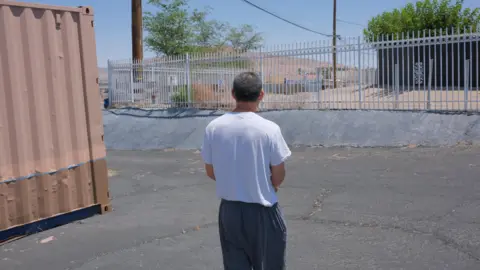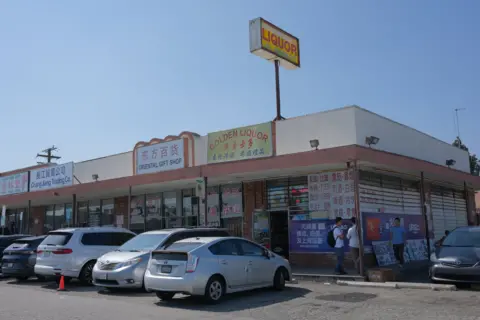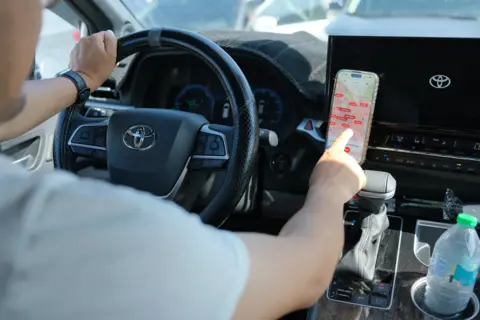Global China Unit, BBC World Service
 BBC
BBCWhen Pan decided to leave his homeland in early 2023, he did so with a conviction that his future no longer belonged there.
As he headed to America, he dreamed of a freer society, a fairer economy, and a life lived with dignity – things he said he could never claim in China, where his home had been forcibly demolished by the local government to make way for real estate development.
To chase that dream, he embarked on a journey of thousands of miles from China to Ecuador in 2023, from which point he trekked jungles as part of his long route. About two months later, he finally made it to the US.
Pan, a soft-spoken man in his late 50s from a small village in Jiangxi province in eastern China, is one of tens of thousands of Chinese nationals who have made the same journey in recent years.
Known colloquially as zou xian ke, or “those who walked the line”, they represent a new wave of migration driven by authoritarian tightening at home and the belief – sometimes naive, often desperate – that the US still offers a fair shot at a better life.
Their reasons for exodus varied, but their experiences once on American soil follow certain trends: many have ended up isolated by language, burdened by debt and surviving on gig work as they wait for their asylum claims to crawl through an overwhelming immigration system.
Some remain hopeful. Others are unravelling.
And all of them, now, are living in the long shadow of President Donald Trump’s political return – during which the poor US-China relations of recent years have soured even further.

‘Hard work here brings hope’
Pan is one of several Chinese migrants who I first met two years ago. Like many of the group who he travelled with, he now works in a Chinese restaurant, even though back home, he prided himself on his farming know-how.
In America, those skills don’t translate, since the soil conditions are different and he doesn’t speak English. Past lives hold little currency.
For a while after arriving, Pan wandered from city to city, sleeping on borrowed couches or bunking with fellow migrants. Eventually, he landed in Barstow, California, a dusty industrial town.
His life today is penned within a tight radius. He cooks and sometimes waits tables at a restaurant during the day, video-calls his wife and children in China at night, and repeats the routine the next day. He lives in a room attached to the kitchen.
To outsiders, and even to his family back home, Pan’s life might seem unbearably monotonous. But to him, it’s defined not by what’s lacking, but by what’s no longer present. No land seizures. No meddling officials. No fear of arbitrary punishment.
“My family doesn’t understand,” he said with a half-smile. “They ask why I left a comfortable life behind. But here, even if it’s simple, it’s mine. It’s free.”
Pan’s sense of freedom is quiet but stubborn. Two years ago, in a cramped hotel room in Quito, Ecuador, he told me on the eve of his journey that even if he died en route, it would be worth it.
He still says the same. “All of this,” he repeated, “is worth it.”
Like many newcomers, Pan doesn’t have any meaningful social circle – the mounting language and cultural difference challenges confine his life to interactions with fellow migrants.
Occasionally, he travels to Los Angeles to join protests outside the Chinese consulate. He admits that is partly to strengthen his asylum claim by establishing a public record of political dissent. But it is also because, after decades of silence, he can.
On 4 June, the anniversary of the Tiananmen Square massacre – a date scrubbed from China’s public memory by the authorities – he stood again outside the consulate chanting anti-Chinese Communist Party slogans. That day, among the familiar crowd, he spotted James.
A young man in his early 30s who hailed from western China, James had travelled with Pan from Ecuador through the Darién Gap and up to the US border. But if Pan’s story is one of quiet stoicism, James’s is more kinetic, more restless.
After his release from a US immigration detention centre, James bounced between cash gigs in Monterey Park, a Chinese-majority suburb east of Los Angeles. He ultimately bought a cargo van, drove out to Palm Springs, and made the car both his livelihood and his home.
The van is cluttered with sleeping bags, gas canisters, and a portable charger – that’s all he needs to be content with his life. During the day, he delivers food around the city; at night, he parks outside a 24-hour gym and sleeps with the windows open.
James was always a hustler in China. But after Covid tanked the economy and political crackdowns left little room to breathe, he decided to leave.
“At least your hard work here brings hope, but back in China, you could work over ten hours a day and see no future,” James told me.

‘America is becoming another China’
Yet hope alone isn’t enough. For nearly all the newcomers, including James and Pan who are by and large content with their life in the US, Trump’s political return has brought back a gnawing sense of instability.
The wave of Immigration and Customs Enforcement (ICE) raids across southern California, Trump’s continuous push to deport undocumented immigrants, and rising US-China tensions including a battle over trade tariffs, have all deepened a climate of paranoia.
As I was re-connecting with the migrants who I first met in 2023, clashes between protesters and the government police forces were unfolding in downtown Los Angeles over recent ICE raids.
The raids were part of the president’s aim to enact the “biggest deportation operation” in US history – a pledge that helped him to win the White House again last year. A CBS News/YouGov poll conducted in early June found 54% of Americans saying they approved of his deportation policy.
The administration says its raids have primarily targeted people with criminal records, although critics say innocent people have been caught up in the drive – sparking anxiety among migrants.
Nearly all of the migrants I reconnected with now hold what’s called an Employment Authorisation Document (EAD) that allows them to legally work in the US, but they have not been granted official asylum status. In Trump’s expansive ICE raid campaign, people who hold exactly the same status as these migrants have been arrested.
But what’s the driving the fear is a sense of unknowing – of if and when these raids will reach the Chinese community, or when the next downturn of China-US relations could be.
Between the two Trump presidencies, US-China relations hardly improved when Joe Biden served in the White House. The Democrat kept earlier Trump tariffs in place, and tensions rose as Beijing escalated its rhetoric over the status of US ally Taiwan.
For some, all the unease has prompted a question that many Chinese migrants have quietly begun to ask themselves: is America worth it?
Kevin, a man in his thirties from China’s Fujian province, didn’t think so. Like Pan and James, Kevin journeyed through Latin America to reach the US. But the American dream he once believed in now feels like a mirage.
When I asked him how settled he was in California’s San Gabriel Valley, where he lives with his wife and their newborn son, he referred to the ICE raids in LA and answered: “Everything feels uncertain. So no, I don’t feel settled.”
Kevin’s disillusionment runs deep. “America, to me, feels like it’s becoming another China,” he said. “A Darwinian society.”
“If I had known what it would really be like, I might not have come,” he continued.
Caught in a pincer
For a long time, what bound all these migrants was the journey they shared on that treacherous road.
But now, that binding has an extra layer: the emotional undercurrent they now swim against two years after they arrived in the US. It is the creeping realisation that their place in America is precarious, that the country they bet everything on might not have space for them after all.
The zouxian wave was driven by desperation – but also by an almost childlike faith in the American idea: that this country, for all its flaws, still offered a shot at dignity. A delivery job. A sliver of land. A bed behind a restaurant where no one came knocking at night.
Now, with Trump portraying China as national security threat, warning of “infiltration,” and promising sweeping crackdowns on many things China-related, even those modest hopes feel more under siege than ever.
The effect is clear. This new wave of Chinese migrants – many of them still awaiting asylum – now feel themselves caught in a pincer: mistrusted by Americans, unwanted by Beijing, and sometimes suspended in legal limbo.
Pan, for one, is bracing for the worst. “The future here doesn’t feel as certain anymore,” he said, standing outside the restaurant in Barstow, watching the freeway traffic blur past. “I’m worried I might not be allowed to stay. And if I go back to China…”
He trailed off. For a moment, he said nothing. Then he looked at me, steady, calm, resigned.
“That thought,” he said, “is unbearable.”
It was the same look I remembered from that hotel room in Quito, two years and a world ago: worry flickering behind tired eyes, but beneath it, a core of absolute resolve.
No matter what happens, Pan told me, he’s staying.



